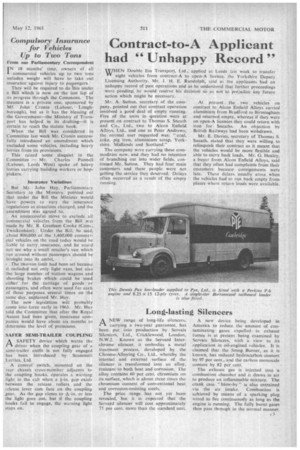Contract-to-A Applicant had "Unhappy Record"
Page 39

If you've noticed an error in this article please click here to report it so we can fix it.
WHEN Double Ess Transport, Ltd., applied at Leeds last week to transfer eight vehicles from contract-A to open-A licence. the Yorkshire Deputy Licensing Authority, Mr. J. H. E. Randolph, said as the applicants had an unhappy record of past operations and as he understood that further proceedings were pending he would reserve his decision so as not to prejudice any future action which might be necessary.
Mr. A. Sutton, secretary of the company, pointed out that contract operation involved a good deal of empty running. Five of the units in question were at present on contract to Thomas S. Sneath and Co., Ltd., two to Alcon Enfield Alloys, Ltd., and one to Peter Andrews; the normal user requested was: "coal, coke. pig iron, aluminium scrap. Yorkshire. Midlands and Scotland."
The company were carrying these commodities now, and they had no intention of branching out into wider fields, continued Mr. Sutton. They had four main customers and these people were not getting the service they deserved. Delays often occurred as a result of the empty running.
At preient the two vehicles on contract to Alcon Enfield Alloys carried aluminium from Bradford to Birmingham and returned. empty, whereas if they were on open-A licences they could return with iron for Sneaths. An objection by British Railways had been withdrawn.
Mr. E. Davies, secretary of Thomas S. Sneath, stated that they were willing to relinquish their contract as it meant that the vehicles would be more flexible and able to carry back loads. Mr. G. Healey, a buyer from Alcon Enfield Alloys, said that they often had complaints from their customers because consignments were late. These delays usually arose when the vehicles had to run back empty from places where return loads were available.
























































































































